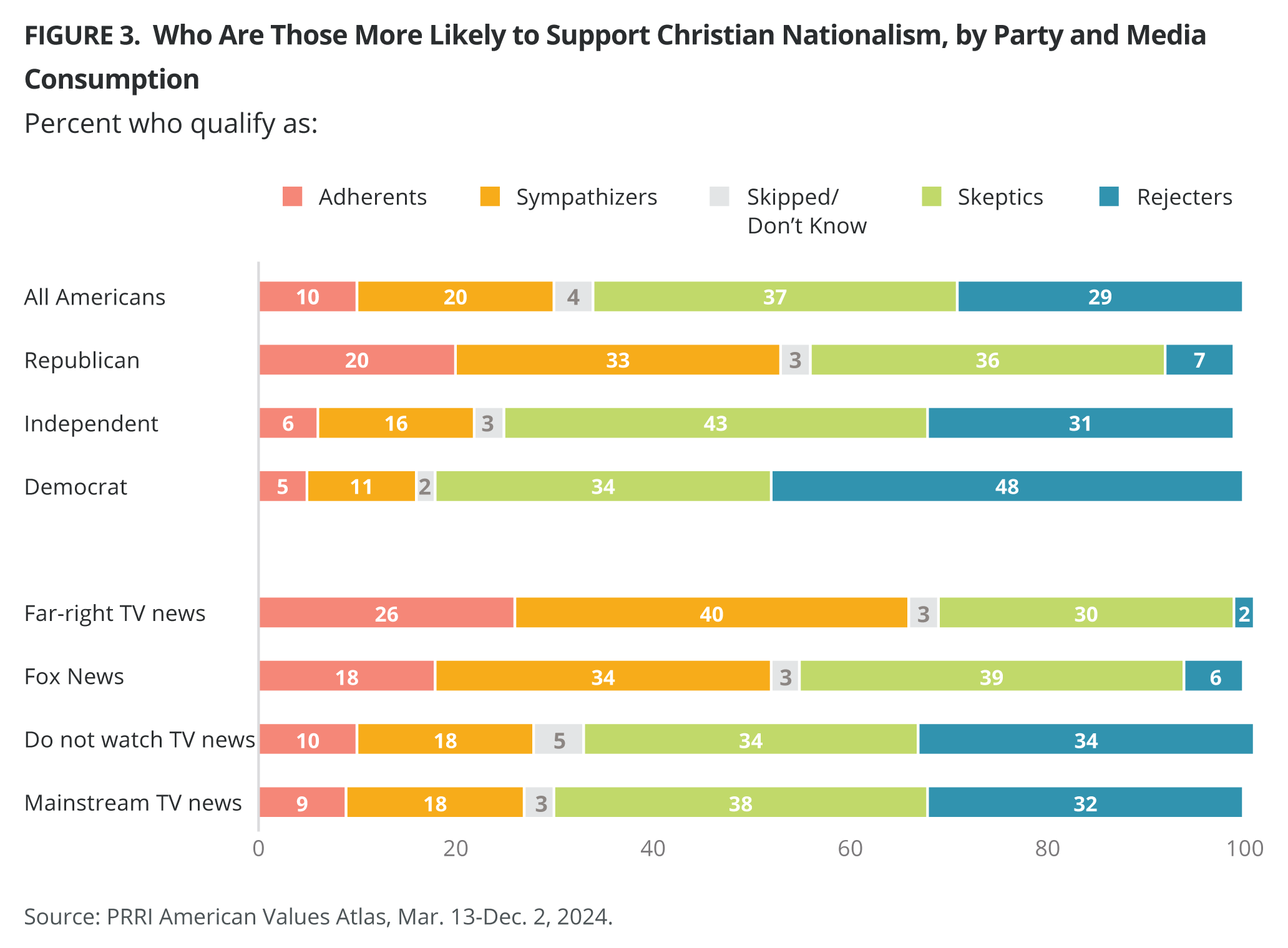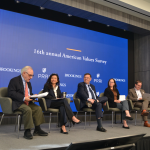Following the release of “Christian Nationalism Across All 50 States: Insights from PRRI’s 2024 American Values Atlas,” PRRI hosted a panel discussion to examine the survey’s findings related to Americans’ support for Christian nationalism and the factors driving such views.
University of Oklahoma Sociology Professor Samuel Perry, Ph. D., and VTE & Fellowships Consultant at Louisville Institute, Erica M. Ramirez, Ph.D., joined PRRI President and Founder, Robert P. Jones, Ph.D., and CEO Melissa Deckman, Ph.D. Together, they discussed the factors contributing to a rise in the influence of Christian nationalism in the U.S., the impact of Christian nationalist ideas on the 2024 presidential election, and Christian nationalism’s relationship to patriarchal views.
Using a set of five questions, PRRI categorizes individuals into four Christian nationalism groups: adherents, sympathizers, skeptics, and rejecters.
In 2024, 53% of Republicans qualify as either Christian nationalist adherents or sympathizers, compared with 22% of independents and 16% of Democrats. Additionally, 37% of those in red states qualify as either Christian nationalism adherents or sympathizers, compared with 31% in battleground states, and 23% in blue states.
Perry asserted that Christian nationalist rhetoric played a role in the 2024 election through Americans’ views on immigration.
“Christian Nationalist ideology is correlated strongly with the perception, especially among white Americans, that immigrants are invading American society and replacing our ethnic and cultural heritage. This rhetoric of replacement wasn’t necessarily used by prominent politicians [in the 2024 election], but it’s certainly prominent among the right-wing media.”
PRRI finds that 68% of Christian nationalism adherents agreed that immigrants are invading our country and replacing our cultural and ethnic background, compared to 36% of all Americans.
Ramirez commented on the role Christian nationalists played in the 2024 election.
“They [Christian nationalists] were willing to take risks at the ballot box and captured enough of the electoral share, and in highly important, electorally-rich states, to make a material difference.”
With this, Ramirez commented on the effects of Christian nationalism on Hispanics and how that affected their votes in the 2024 election.
“Hispanic Protestants are shifting toward the right in both Florida and Texas, and we see the same thing with Hispanic Catholics in Florida. What I’m seeing is that this resilient, risk-taking population is also enough of a diverse population that these groups are carrying enough influence with Hispanic voters to trouble what has been a long-established Democratic party bet, which is that these voters will vote primarily on their ethnic interest.”
Deckman noted how ideas about masculinity and gender influenced the 2024 election.
“We’ve just emerged from a presidential campaign in which themes of militant masculinity played a front-seat role in this election. And we know that attitudes about gender really help to explain people’s electoral choices.”
Additionally, Deckman noted how Christian nationalist ideology is largely linked with patriarchal thinking.
For instance, 72% of Christian nationalist adherents agree that society as a whole has become too soft and feminine, compared with 43% of all Americans. Around six in ten Christian nationalism adherents (61%) agree that society is better off when men and women stick to the jobs and tasks they are naturally suited for, compared with 35% of all Americans.
Despite the patriarchal views of Christian nationalist adherents, men are not more likely to be Christian nationalists than women. Americans are also not becoming significantly more conservative on gender attitudes. In 2016, 42% of Americans agreed that society was becoming too soft and feminine, compared to 45% in 2024.
“Despite seeing this growing prominence of more conservative patriarchal views within the GOP, we’re not finding that Christian national ideology is growing at all. Nor are men or women having differences of opinion when it comes to Christian nationalist ideology.” Deckman added.
Finally, Jones discussed shifting U.S. religious demographics as a contributing factor to the rise of Christian nationalism as a political movement in recent years.
In 2008, 54% of Americans identified as white Christians; that percentage decreased to 41% in 2024. “That’s a steep decline…. When the numbers aren’t there and Christian nationalists realize they can’t achieve their ends with democratic means, there is a reach for extra-democratic means to achieve those goals.” Jones stated.
View the full event recording here and check out Christian Nationalism Across All 50 States: Insights from PRRI’s 2024 American Values Atlas.
Slides presented during the webinar are available here.








